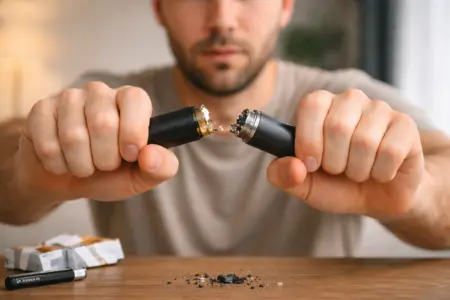Table of Contents
Are you worried you, or someone you care about, is currently experiencing a codeine overdose? This article will talk you through what happens during an overdose, what to do, and what treatment you can expect to receive.
It’s important to note that codeine is both a prescription drug and addictive, so in some cases people may end up unintentionally addicted to it and suffer an overdose.

Download Our Brochure
Codeine Overdose Summary
- Codeine is an opiate pain medication often used to treat injuries and chronic pain by blocking pain signals
- Like other opiates it is addictive and abusing it can lead to overdose and even death
- Codeine-related deaths have increased by almost 25% in 2021
- Signs of a codeine overdose include: blue lips, clammy skin, small pupils, drowsiness, and unconsciousness
- Overdosing on codeine damages your respiratory system which limits the oxygen getting to your brain, which can result in brain damage and death
- Long-term health effects of abusing codeine include liver and kidney damage, depression, and seizures
- If you are experiencing or witnessing a codeine overdose you should call 999 (as it is a medical emergency)
- If you are with someone experiencing a codeine overdose, keep them calm, clear the space in case they have a seizure, and put them in the recovery position if they become unconscious
- If they stop breathing, perform CPR
- Codeine overdose treatment may include IV fluids, laxatives, and breathing support, along with Naloxone to reverse opioid overdose
- Codeine is commonly mixed with alcohol, benzodiazepines, and other opioids, despite the increased risk of side effects
- Codeine overdose is often a sign of underlying codeine addiction and once you have detoxed from codeine you should seek addiction treatment
Signs, Risks & Symptoms of a Codeine Overdose
One of the most commonly used opioid narcotics in the world, codeine is a prescription drug used to treat mild to moderately severe pain. You may be prescribed codeine following an injury or for chronic pain which you cannot manage with other medication.
It is available in tablet form, though can be used in cough syrup to treat coughs. Codeine is a fairly short-acting analgesic, with most effects wearing off after a few hours. Like all opiates, codeine can be addictive.
For the duration of the time you take codeine, it is important you stick to the dosage prescribed by your healthcare provider. If you increase your dosage, it can cause you to overdose which can lead to severe complications.
Unfortunately, many people increase the dosage because, along with the pain relief, they enjoy the feelings of joy and even euphoria that come with taking codeine. As your tolerance to codeine increases, you’ll need more and more to get those same pleasurable feelings.
This happens because of the way opiates interact with the central nervous system, which involves activating the reward systems and releasing pleasurable hormones. But increasing the dose to chase these momentary feelings of euphoria can come with many serious health consequences and can lead to a codeine overdose.
What Happens in a Codeine Overdose?
If you, or someone you know, is experiencing a codeine overdose you may notice the following signs:
- Blue lips or fingernails
- Intense muscle weakness
- Cold or clammy skin
- Breathlessness
- Lethargy and fatigue
- Small pupils
- Slow pulse
- Low blood pressure
- Itching
- Stomach pain
- Slurring
- Nausea
- Drowsiness
- Unconsciousness
- Coma
Overdosing on codeine can also be fatal. This is more common when people have mixed codeine with other opiates, drugs, or alcohol.
This happens because overdosing causes damage to your respiratory system, which reduces the amount of oxygen getting to your brain. This can result in your brain cells dying which can cause a coma, brain damage, and in some cases even death.

Free Addiction Assessment
If you survive the overdose but continue abusing codeine, you may end up suffering further health complications. Here are just some of the long-term effects associated with abusing codeine:
- Liver damage
- Kidney damage
- Heightened sensitivity to pain
- Acute pancreatitis
- Depression
- Muscle spasms
- Respiratory depression
- Coma
- Seizure
- Death
If You Think You’re Having (Or Witnessing) a Codeine Overdose
It can be frightening to both witness or experience a codeine overdose, but the most important thing to remember is to stay as calm as possible.
A codeine overdose is a medical emergency. So if you are worried you or someone you know has had a codeine overdose, call 999 immediately.
Before you call, try and make sure you know:
- The person’s age
- What combination of substances or alcohol they have taken with the codeine
- What time they took it at
- How much they took
- If they had a prescription for the codeine
If you aren’t sure of all of those details, don’t panic, just call for help.
While you are waiting for help to arrive, it’s important to stay with the person you think has overdosed.
If they remain conscious and start to become worried, the main thing to do is try to keep them as calm as possible by reassuring them that help is on its way and the chances are they will make a full recovery.
If at any point they experience a seizure, you should clear the space they are in to minimise the chance of them hurting themselves.
Should they become unconscious, put them in the recovery position and pay attention to their breathing. If at any point they stop breathing, you’ll need to perform CPR on them. You should contact 999 for guidance.

How Are Codeine Overdoses Typically Treated?
Once medical help has arrived, they will check the person’s vital signs including their blood pressure, breathing rate, pulse, and temperature.
If you require hospital treatment, medical staff will most likely carry out a range of tests to find out exactly what is going on. These might include:
- Blood test
- Urine test
- CT scan
- X-ray of chest
- ECG
Depending on what those tests reveal, the treatment administered could include:
- IV fluids
- Laxative
- Breathing support
Treatment could also include Naloxone, given under the brand names Prenoxad and Nyxoid. This medication is most commonly used to reverse opioid overdose.
If a reversal medication is not given, activated charcoal may be given as it can help limit the absorption and help eliminate certain drugs via the gastrointestinal tract.
Once the person is stable, treatment for the underlying addiction will need to be considered. Various treatments are available for long-term addiction help, but to start with a codeine detox would be necessary.
The withdrawal process can be uncomfortable, so going through the process in a professional, clinical setting at an addiction treatment centre is often the optimum way to do it.
Mixing Codeine With Other Drugs
You should read the information that comes with your codeine prescription before taking it. It is especially important to avoid mixing codeine with alcohol, benzodiazepines like diazepam, and other opioid drugs.
Codeine and Alcohol
Codeine and alcohol both work by depressing the central nervous system, so when combined they can have a powerful effect that can result in health complications and increase your risk of experiencing an overdose and even death.
Taken together, alcohol and codeine can cause:
- Drowsiness
- Dizziness
- Lightheadedness
- Difficulty concentrating
- Fainting
- Impaired cognitive function
- Slowed breathing
- Low blood pressure
- Coma
- Death
These two central nervous system depressants can severely impair your mental state and put your health at serious risk. Because of this, alcohol and codeine should never be mixed.
Codeine and Benzodiazepine
Taking codeine with a benzodiazepine like diazepam (still sometimes referred to as valium) is also not a good idea. Like alcohol, both of these drugs are central nervous system depressants so can exacerbate the side effects of both.
If you take codeine and a benzodiazepine your central nervous system will slow down, which may cause you to become very drowsy, and lethargic and experience symptoms like a slow breathing rate. It can also lead to coma and death if you end up accidentally overdosing.
Occasionally both of these medications are prescribed together, but this is becoming an increasingly rare practice because of the risk involved. The government now warns healthcare providers to: “only prescribe benzodiazepines (or benzodiazepine-like drugs) and opioids together if there is no alternative”.
Codeine and Other Opioids
Mixing codeine with other opioids like tramadol, fentanyl, and morphine is not a good idea. Like with alcohol and benzodiazepines, opioids will depress your central nervous system, and taking more than one kind can exacerbate this effect and result in a range of negative health outcomes, from seizures to brain injury and death.
Codeine Overdose Statistics
- Codeine-related deaths have increased by almost 25% in 2021, reaching a record high
- Nearly half of all drug poisoning deaths registered in 2021 involved an opiate
- 5.6 million people a year are prescribed opiate-based medicines in England and at least 25% are taking them for over three months
- 50 million prescriptions were written for opioids last year, a 35% increase in the last decade
- In that same timeframe, overdoses have increased by 87% to 12,000 and deaths by 41% to 4,000 a year.
- Of the 115,000 prescriptions written each day, five result in a death
- In the UK in 2013/2014, 2.2% of those attending specialist addiction treatments did so for codeine
Codeine Abuse & Addiction
Codeine is an opiate used to treat pain following an injury or chronic pain. It works by affecting the brain’s reward system and creates feelings of pleasure, contentment, and even euphoria.
Like other opiates, it is addictive and you can end up developing a tolerance to codeine fairly quickly. After a while, you may not actually get the associated high and you’ll require more codeine to simply function.
Contact Us Today
Your path to lasting recovery starts here
If you are worried that you or someone you care about is addicted to codeine, these are some signs to look out for:
- Dizziness
- Small pupils
- Slow breathing
- Blue lips or fingernails
- Itching
- Confusion
- Delusions
- Depression
- Anxiety
- Hallucinations
If this continues to go unchecked, the risk of overdose increases. This can result in a range of negative health consequences and can even result in brain damage and death.
Some of the other long-term side effects of using codeine can include:
- Insomnia
- Nightmares
- Liver damage
- Kidney damage
- Pain
- Seizures
- Digestive issues
- Depression
- Anxiety
If you recognise that you, or someone you love, is addicted to codeine don’t worry: you can beat this addiction. It will involve going through a withdrawal process and then, most likely, engaging in treatment to deal with the underlying causes of your addiction.
Ready to take the next step? We’re on hand to offer non-judgemental support, talk through your concerns and help you see the first step.





Codeine Overdose FAQs
What Happens if You Take Lots of Codeine?
Taking large amounts of codeine can increase your likelihood of developing an addiction and could result in overdose, which could lead to brain damage or even death.
Can You Overdose on Codeine?
Taking more codeine than you have been prescribed, or by taking codeine you have obtained through a friend or dealer, can increase your chances of overdose and other unpleasant side effects.
How Do You Treat Codeine Overdose?
Treatment for codeine overdose could include IV fluids, laxatives and breathing support. You may also be given medication, like Naloxone, to reverse opioid overdose.
Can Codeine Cause Sudden Death?
Long-term use of codeine, especially at high dosages or mixed with other substances or alcohol, can result in breathing issues, comas, brain injury and death.


